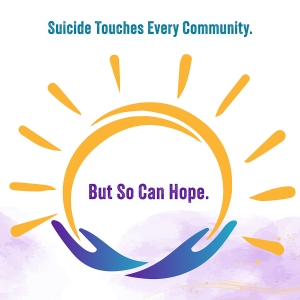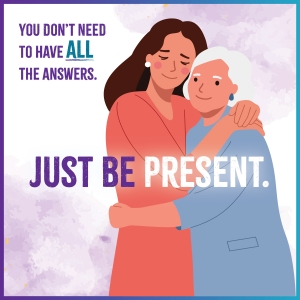Understanding the Importance of Suicide Prevention Month: How Awareness Can Save Lives

Suicide Prevention Awareness Month 2025 graphic from SAMHSA’s Toolkit.
Every September, communities come together to observe Suicide Prevention Month. This crucial time serves as a powerful reminder of the importance of mental health awareness and the role each of us can play in supporting our loved ones. By understanding risk factors, engaging in meaningful conversations, and knowing where to turn in a mental health crisis, we can collectively make a positive impact. Remember, a supportive community is vital for those at risk and can provide the necessary foundation for hope and healing.
Understanding Suicide Prevention
September marks Suicide Prevention Month, a vital period to raise awareness and provide support systems for those struggling with suicidal thoughts or mental health challenges. Recognizing the crucial elements of suicide prevention can empower us all to lend a helping hand and make informed decisions about mental health support.
Importance of Mental Health Awareness
Mental health awareness is a cornerstone of suicide prevention. By understanding the various mental health challenges individuals face, communities can foster more inclusive and supportive environments. Awareness provides the knowledge needed to identify early signs of distress, promoting a proactive approach to mental health care.
Building awareness involves education about mental health issues and dismantling the stigma that often surrounds them. It encourages open conversations about feelings and emotions, making it easier for individuals to seek help. In schools, workplaces, and communities, mental health awareness can pave the way for supportive networks that assist in preventing mental health crises.
Common Risk Factors for Suicide
A comprehensive understanding of the risk factors associated with suicide can aid in early identification and intervention. Such factors are often multifaceted, encompassing mental, physical, and environmental elements. Here are some common risk factors:
- Mental Health Disorders: Conditions such as depression, anxiety, bipolar disorder, and substance abuse are prevalent among individuals at risk.
- Family History: A history of suicide or mental illness in the family can increase vulnerability.
- Severe Stress or Loss: Experiences such as job loss, relationship breakdowns, or the death of a loved one can contribute to suicidal thoughts.
- Trauma and Abuse: Individuals who have faced trauma, including physical or sexual abuse, may have a higher risk.
Understanding these risk factors is essential for preventative measures and provides insight into the complexities of suicide.

From SAMHSA’s Suicide Prevention Awareness Month 2025 toolkit.
Supporting Loved Ones
Being there for loved ones dealing with mental health challenges is crucial in preventing suicide and fostering overall well-being. Here’s how you can effectively support those around you and create a nurturing environment.
Recognizing Warning Signs in Mental Health
Identifying warning signs is a key step in providing timely support to those who may be experiencing mental health issues. Here are some signs to recognize:
- Verbal Clues: Talking about feeling hopeless or having no reason to live may indicate distress.
- Behavioral Changes: Withdrawal from social activities, changes in sleep patterns, or increased use of substances could signal mental health issues.
- Mood Swings: Dramatic shifts in mood, including increased anxiety, aggression, or depression, are notable signs.
Recognizing these signs can lead to early intervention, encouraging those in need to seek professional help and support.
Starting a Conversation about Mental Health
Initiating a conversation about mental health can be challenging, but it is essential for offering support. The aim is to create an open and judgment-free dialogue where individuals feel safe to express their feelings. Here’s how to do it:
- Approach with Empathy: Use a caring tone and express your concern. Statements like “I’ve noticed you’ve been sad lately, and I’m here for you,” can open the floor for dialogue.
- Listen Actively: Give your full attention and listen without interrupting. This shows that you value their thoughts and feelings.
- Avoid Judgment: Create a supportive atmosphere by avoiding criticism and judgment. Instead, offer validation and understanding.
These steps can facilitate a conversation that may encourage your loved one to open up and explore options for help.
Ways to Offer Support and Encouragement
Being supportive and encouraging can make a significant difference for someone in distress. Here are effective ways to offer this support:
- Be Present: Sometimes, just being there can provide comfort. Offer company or a listening ear when needed.
- Encourage Professional Help: Guide them towards seeking professional assistance if necessary, be it therapy, counseling, or medical intervention.
- Support Healthy Habits: Encourage practices that promote mental health, such as physical activity, a balanced diet, and adequate sleep.
- Check-in Regularly: Maintain connection by regularly reaching out and asking how they are doing.
These approaches can aid in constructing a strong support system, helping loved ones navigate through their mental health journeys. Suicide prevention is a collective responsibility, and by adopting these strategies, we can offer meaningful support to those in need. Together, we can foster a community of care and understanding. If you or someone you know is struggling, don’t hesitate to reach out to a professional or use resources like the 988 Lifeline. Your actions today can change lives.
Conclusion
As we navigate through Suicide Prevention Month this September, let’s remember the significant role each of us plays in the mental health journey of our community. Engaging in open conversations, recognizing risk factors, and supporting loved ones can truly make a difference. By uniting our efforts, we can create a more compassionate and understanding environment.
- Reach out to those who may be struggling.
- Encourage the use of resources like the 988 Mental Health Crisis
Remember, you’re never alone in this journey. Empower yourself and others by staying informed, being supportive, and advocating for mental health awareness. Together, we can break the stigma and move towards a brighter, healthier future.



